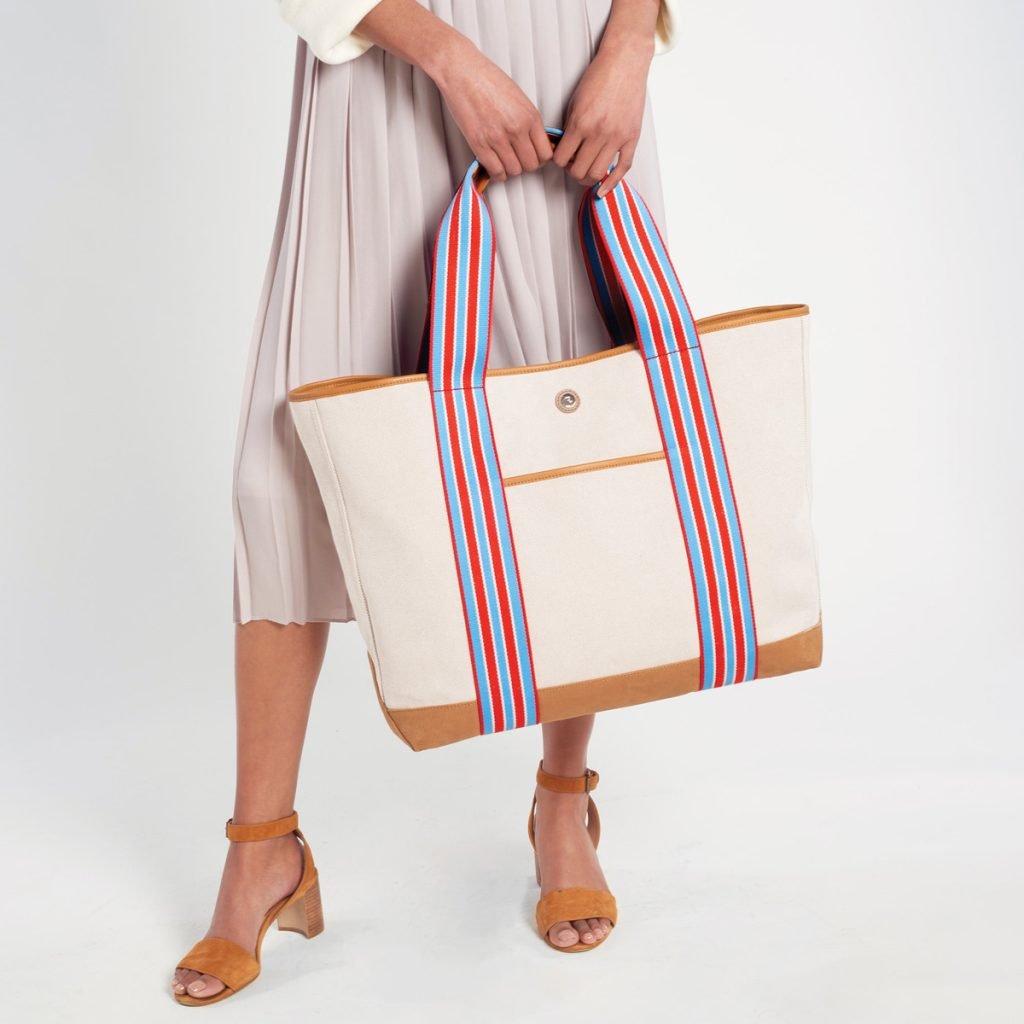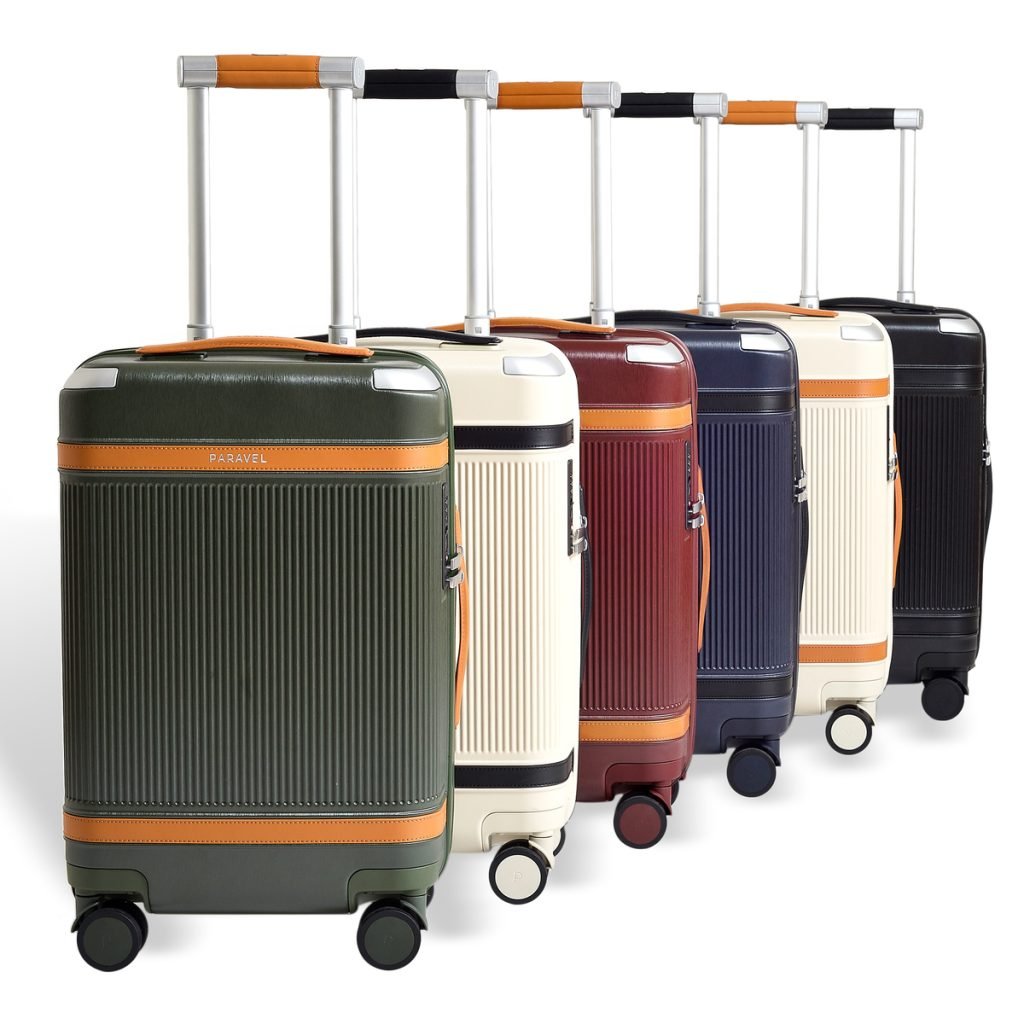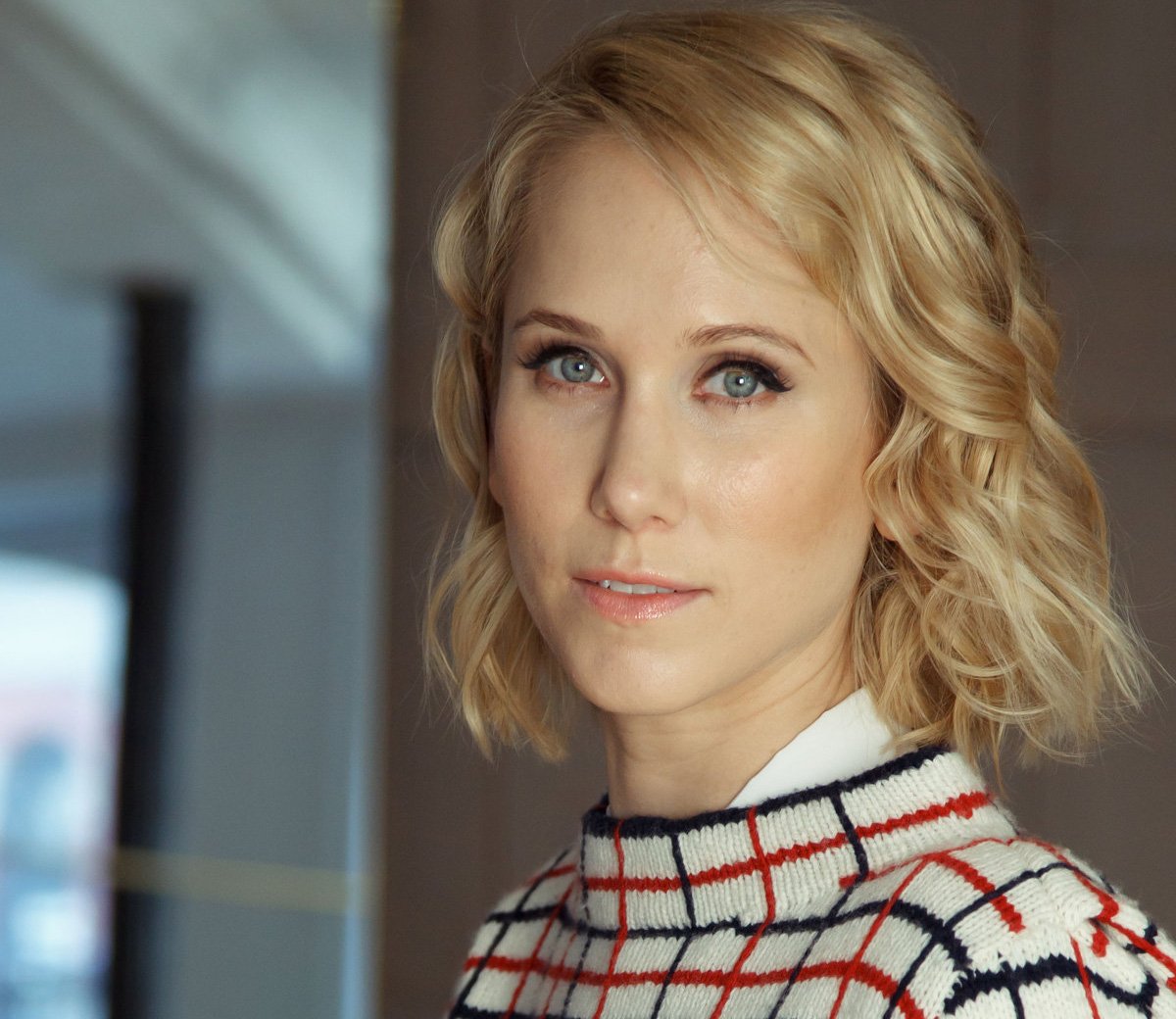For most of us, the thought of traveling has become as foreign as working in a physical office or assuming stores have toilet paper in stock. With the majority of states locked down and 60 percent of commercial airplanes grounded worldwide, the coronavirus pandemic has upended life as we know it, and one of the hardest hit industries is, without a doubt, travel.
But the current standstill isn’t stopping some companies from planning for a better, brighter future, and at the forefront of this movement—at least in the travel goods space—is a storied name, synonymous with revolutionizing the business landscape: Rockefeller. Cofounder and co-CEO of luxury luggage and accessories company Paravel, Indré Rockefeller is the very definition of a powerful businesswoman—with or without her last name. She got her start in fashion at Vogue as Anna Wintour’s first assistant, before moving on to executive roles at Moda Operandi and Delpozo. Her love of travel and experience in the fashion industry eventually led her to launch Paravel in 2016.

“I have always viewed travel as aspirational and educational, but the travel goods industry has historically been an unsexy space within travel,” Rockefeller says of starting her brand. “My cofounder and I saw an opportunity to bring products to life that we couldn’t find elsewhere and add elements that were important to us as consumers. We were able to bring lessons into the travel space from previous experiences, which for me was primarily fashion, but also be forward-looking in terms of what the future of travel could look like.”
Worth recently spoke with Rockefeller about how Paravel has been giving back during the COVID-19 pandemic, how she’s been using this time to help her brand reach its goal of 100 percent sustainability by 2021 and what the future of travel will look like in a post-coronavirus world.

Q: Obviously, there’s a crisis happening right now, and I wanted to ask you a little bit about how Paravel is coping at this time, especially with travel mostly suspended across the globe.
A: As with all companies, we are very cognizant of the environment around us and are looking at it in two ways. One is internally, how do we find efficiencies in our business so that we can come out the other end of this rearing and ready to go from a commerce standpoint.

But I’d say, more importantly, we are focused on connecting with our Paravel community and evaluating what we can do for our global community. Even as a small business, the tone we strike and the modest contributions we can make financially to those most in need are an important part of our process that we are evaluating right now. We have been donating 15 percent of proceeds from every purchase to Direct Relief, which provides health care workers on the front line of the pandemic with equipment, such as masks, gloves and protective gear. That was the first step we took, and we are evaluating additional actions. But I’d say, it’s been a twofold process—looking internally and looking externally.
A lot of companies are cutting back right now, in terms of staffing and pay cuts and things like that. But Paravel have been donating proceeds, which is amazing. Are customers excited and responding to that?
We shared our intentions and announced the donation through various channels, including email and social media, and have had more customers write in to just thank us and connect with us. The response has been stronger and more heartfelt than almost any other communication we’ve had to date. It shows us that there is not only an opportunity for us to give back but also for small brands like us to forge a stronger bond with our community during difficult times. Our customers know that everyone is trying to do their best, and this applies to any challenge, but I think they appreciate when brands have transparent conversations, even on difficult topics.
Definitely. Do you see this pandemic, and the current situation, changing the future of travel or could it potentially just go back to normal?
After living through something like this, I don’t think that things just bounce back to normal; I think normal becomes redefined a bit. When it comes to travel specifically and people’s desire and need to travel, I think that will absolutely return and that will return with force. I think when you live through something like this, you learn to appreciate a lot of things that you take for granted. None of us know what the full extent of the effect of this will be in terms of lives lost and fundamental changes to how we think about health insecurity. So, I can’t speak to that, but I do know that once this is behind us, people will have an appreciation for things that they may have taken for granted. And one of those is very much travel because it’s something that connects the world and people. And I think if there’s one thing that the global community has learned to appreciate, it’s each other. There’s an increased desire to connect with one another, especially right now, while we’re all living in little isolated bubbles.
I’ve seen many articles talking about how the current situation aligns with what’s been going on with climate change. Paravel is a very eco-friendly brand, and I wanted to discuss sustainability with you. Was that always an issue that you were hoping to tackle when you founded the brand?
It’s interesting. My cofounder and I have always considered ourselves environmentalists and sustainably minded. In the beginning, when we first launched our brand, that was the thing that was on our bucket list, but at the time, we didn’t have the access or the scale to reach and, frankly, the supply chain had not developed a lot of materials that we are now using. So, it was at a time where we were constantly looking for innovations in the space that we could incorporate into our supply chain, into our business, into our materials. From the outset we were thinking about it, but it was an item that was on our bucket list for about a year.
I took a trip to Antarctica, almost two years ago now, with the Nature Conservancy on a polar expedition. That was a very transformative trip for me. I was able to witness firsthand a lot of the intangible effects that climate change is having on such a pristine climate. And I remember my first call, we had no service during that trip. It was completely immersive, but when we docked back in Argentina, my first call was to my cofounder, Andy [Krantz]. We had a conversation around reprioritization, and we never looked back after that. It was taking sustainability from bucket list status to making it the number one priority to address and figure out. Sometimes, as a business, it is about clearing off the slate to be able to tackle something big like that. And we were able to do so at a time, fortunately, when a lot of innovation was happening around the supply chain and a lot of people’s attention had started turning in this direction, especially in the fashion industry.

The travel goods industry had not yet aggressively tackled the topic the way some other industries had, but we were able to use a lot of the developments that had happened and push our factory, push our suppliers into being able to create some really sustainable products that we’re very proud of. Like our Aviator suitcase that was built soup to nuts to be, of course beautiful, of course functional, but most importantly as sustainably made as it could be for hard-sided luggage.
I understand that the goal is to become 100 percent sustainable by 2021, is that still on track?
Yes. It’s something we are working on every day. We’re actually taking a lot of the time now, while everyone’s working from home, to regularly check in on that and, so far, everything is on track.
Our goal is to have every single product as sustainably made as possible and obviously extend into fully sustainable packaging, which we’re well on our way toward, but also pushing the envelope more into new materials and new innovation in the category. And dropping capsule collections and products that allow us to push the envelope even further.
When you’re running a business that’s so design-heavy, how do you keep this in check? Paravel makes such beautiful products, on top of being sustainable, and sells them at a price point that’s quite affordable. How do you balance those factors?
So, we really look at our product as having a four-legged stool, and the core qualities are design, quality, price and sustainability. Our thesis is that you don’t have to give up one of the legs of the stool to get to the other three or two. And when it comes to design, in particular, my belief is that design is not a function of price, it’s a function of caring. It’s really about having a passion for design. When I came into this business, I had spent a lot of time in the fashion industry. I had been working alongside designers for a lot of my career. I had been working on capsule collections for various brands and had worked on the retail side, the editorial side, the brand side.
For me, I was already immersed in the world of design and that was something that I brought with me, as a founder, from the fashion industry and applied to products that historically had often been overlooked from a design standpoint. Functionality was king, but I didn’t see those things as being mutually exclusive. And we felt the same regarding price and sustainability. It is possible to have all four, it’s just a matter of caring and prioritizing.
That makes sense. I know you had a highly successful career in fashion before founding Paravel. What made you want to transition into the travel and luggage space? Was that kind of a natural flow or was there some more specific reasoning behind the pivot?
The simple answer is I’ve always been passionate about travel, I’ve always loved travel. It’s something I have done from a very early age. I love how it connects the world; I love how it opens my own mind. On top of that, I saw travel as something that was so aspirational and educational, but the travel goods industry had always been very unsexy within a very aspirational space. I saw an opportunity to bring products to life that I saw were missing, that I couldn’t find, and added elements that were important to me as a consumer. I really saw an opportunity to bring a lot of the lessons I found in fashion into this space.
Clearly, you’re incredibly successful in your own right, but I feel like women, in general, are often unfairly asked to explain how they reached where they are—just because they’re women. As a Rockefeller, is that unfounded questioning almost twofold for you with such a high-profile last name?
I think every entrepreneur, especially every female entrepreneur, like you said, has had moments where they are questioned, whether it’s subtly or intentionally why they’re in the room, whatever the metaphorical room may be. And you just can’t let those questions get to you. You just can’t let them matter because the only thing that matters is the business that you’re building. And ultimately—whatever you’re pursuing, whatever the question is, why you’re in the room—what matters is the result.
Have I felt questioned before for various reasons? Absolutely. Do I let that stop me? No, because what’s the point? It doesn’t matter in the end, it’s what you put out into the world that matters. That’s what counts.
Do you have any advice for female founders specifically right now who are struggling with the pandemic?
It is unprecedented, and the only advice I can give is the advice that I’m giving myself. But I think aside from finding ways, which is specific business to business, to tighten belts and ride it out and keep a long-term view, I think the important element here is to not forget the loyal community around you. I think every brand, female founders especially, tend to have built communities, and that is really powerful at a time like this. And being able to access that, being able to reach out, being able to see how you can give back, it doesn’t even have to be financially, there’s a lot of ways. I don’t think anyone truly knows where and when this will end, and it is overwhelming even as a human being. And then, as a business owner, you have your responsibility to your employees, to your investors, to your community and that can be very daunting. But I think taking the long view and remembering that community that you’ve built and tapping into it and communicating with that community can actually really help.
Where’s the first place that you want to travel when everything is over? Where are you looking forward to going the most?
I have a lot of trips that I had planned that are on hold, and a lot of them have been canceled, depending on how far out they are. But as a New York resident, New York City has been hit especially hard. I’m really looking forward to just being a tourist in my own city for a bit and being able to go out and go into crowded places—what New York does best—and support the restaurants, get into Central Park and really be a traveler in my own city. Usually, I love being all over the world, but I think New York is so strong, so resilient, has been through so much, and there’s something about being able to sort of rub elbows with all of its residents again that I’m looking forward to.







